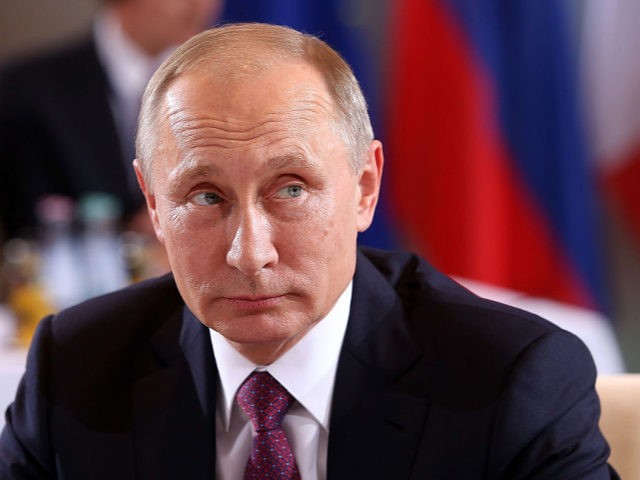Ukraine on Wednesday shut down several television channels owned by businessman Viktor Medvedchuk, a close ally of Russian President Vladimir Putin.
Ukrainian President Volodymyr Zelensky described the action as “difficult” but necessary to protect his country against propaganda from the “aggressor country” of Russia.
“Ukraine strongly supports freedom of speech. Not propaganda financed by the aggressor country that undermines Ukraine on its way to the EU and EuroAtlantic integration. Fight for independence is fight in the information war for truth and European values,” Zelensky said on Twitter.
A spokeswoman for the Ukrainian president said the three banned TV channels – called 112 Ukraine, NewsOne, and ZIK – posed a threat to national security because they were “instruments of war against Ukraine.”
The three banned channels issued a joint statement accusing Zelensky of “political repression” and lamented the hardships inflicted upon their employees.
“With one stroke of a pen, Zelensky threw out 1,500 journalists and other employees of the three stations into the street and deprived millions of people of the right to receive objective information,” they said.
The U.S. embassy to Ukraine supported Zelensky’s effort to “counter Russia’s malign influence” and “prevent disinformation from being deployed as a weapon,” while the Kremlin denounced the ban and suggested an investigation by international agencies. Medvedchuk said he would challenge the shutdown order in court.
Zelensky met with ambassadors from the Group of Seven (G7) nations and the European Union (EU) on Thursday to defend his action against Medvedchuk’s outlets.
“Sanctions against the media are always a difficult decision for any government except an authoritarian one. This decision was not a spur-of-the-moment decision, but one that had been in the works, based on information over a long time from many Ukrainian government agencies. This is by no means an attack on freedom of speech, this is a well-founded decision to protect national security,” he said.
The EU was skeptical of Zelensky’s action, acknowledging Ukraine’s interest in defending itself against “information manipulation” but insisting that such defense “must be done in full respect of fundamental rights and freedoms and following international standards.”
Medvedchuk, 66, is a close personal friend of Putin, his daughter’s godfather, in addition to serving as a major business and political ally. Bloomberg News characterized him in December as “Putin’s man in Ukraine.”
Medvedchuk was sanctioned by the U.S. Treasury Department in 2014 for threatening Ukraine’s sovereignty and undermining its institutions, including support for separatist violence and Russian intervention. The Treasury Department described him as a “long-time proxy and close personal friend” of Putin.
The pro-Russian Ukrainian opposition party Medvedchuk chairs, which is literally named “Opposition Platform for Life,” has been gaining strength in the polls, but still holds only a few seats in parliament, its popularity ironically capped by the loss of so many pro-Russian voters when Russia annexed Crimea in 2014.
Medvedchuk’s party seems unlikely to ever become a dominant force in the Ukrainian legislature, but as Bloomberg News noted, it is big enough to serve the Kremlin’s interests by obstructing legislation and chipping away at Zelensky’s popularity. Medvedchuk’s television channels have unquestionably given the party an outsized platform.
The Atlantic Council reported in June 2020 that Medvedchuk (and by extension Putin) controlled a dangerously large portion of Ukraine’s “information space” and was aggressively using his influence to “discredit Ukraine’s reform agenda and promote a spate of anti-American narratives.”
“Putin controls 50 percent of the news channels in Ukraine, so he can easily control 50 percent of the minds and hearts of Ukrainians,” former Ukrainian prime minister Arseniy Yatseniuk warned in a speech quoted by the Atlantic Council.
Polls released on Thursday found Zelensky recovering from a dip in his approval ratings and leading Opposition Platform for Life candidate Yuriy Boyko, 21 percent to 17 percent. The president Zelensky unseated in his stunning April 2019 upset victory, Petro Poroshenko, came in third with 16 percent. The next presidential election is scheduled for March 2024.
Zelensky, a neophyte candidate who previously starred in a TV comedy about a neophyte candidate who becomes president, took an astounding 73 percent of the vote against Poroshenko in 2019. His lead against each of the current contenders increases considerably in head-to-head matchups, soaring to 20 percent against Boyko, which suggests a good number of voters willing to consider an alternative to Zelensky are even more displeased with each of the other candidates.

COMMENTS
Please let us know if you're having issues with commenting.